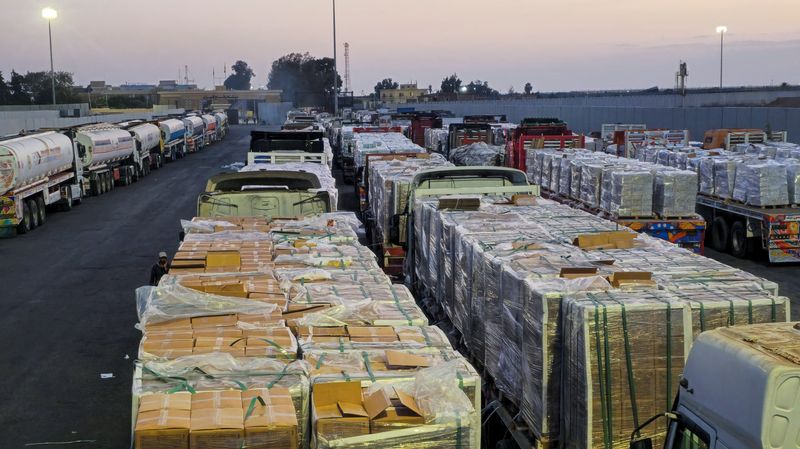By Nidal al-Mughrabi and Maayan Lubell
CAIRO/JERUSALEM (Reuters) -The Rafah border crossing between Gaza and Egypt will remain closed until further notice, Israeli Prime Minister Benjamin Netanyahu said on Saturday, adding its reopening will depend on Hamas handing over bodies of deceased hostages as the two sides continued to trade blame over ceasefire violations.
Netanyahu’s statement came shortly after the Palestinian embassy in Egypt announced that the Rafah crossing, the main gateway for Gazans to leave and enter the enclave, would reopen on Monday for entry into Gaza.
Netanyahu’s government and Hamas have been trading blame over violations of the U.S.-mediated ceasefire for days. Late Saturday in Washington, the State Department said it had received “credible reports” indicating Hamas would violate the pact.
“Should Hamas proceed with this attack, measures will be taken to protect the people of Gaza and preserve the integrity of the ceasefire,” the department said in a statement, without providing further details.
Trump had said he would consider allowing Israeli forces to resume fighting in Gaza if Hamas fails to uphold its end of the ceasefire deal that he brokered.
The State Department did not immediately respond to a request for additional information.
Hamas also did not immediately respond to a request for comment.
DISPUTE OVER AID, RETURN OF BODIES
Hamas, in a statement late on Saturday, said Netanyahu’s decision “constitutes a blatant violation of the ceasefire agreement and a repudiation of the commitments he made to the mediators and guarantor parties.”
It also said the continued closure of the Rafah crossing would prevent the entry of equipment needed to search for and locate more hostage bodies under the rubble, and would thus delay the recovery and handover of the remains.
Israel said it received two more bodies late Saturday, meaning 12 out of 28 bodies have been handed over under a U.S.-brokered ceasefire and hostage deal agreed between Israel and Hamas last week.
The war has caused a humanitarian catastrophe in Gaza, with nearly all inhabitants driven from their homes, a global hunger monitor confirming famine and health authorities overwhelmed.
The dispute over the return of bodies, and shipment of life-saving humanitarian aid, underlines the fragility of the ceasefire and still has the potential to upset the deal along with other major issues that are included in U.S. President Donald Trump’s 20-point plan to end the war.
As part of the deal, Hamas released all 20 living Israeli hostages it had been holding for two years, in return for almost 2,000 Palestinian detainees and convicted prisoners jailed in Israel.
FORMIDABLE OBSTACLES TO PEACE
But Israel says that Hamas has been too slow to hand over bodies of deceased hostages it still holds. The militant group says that locating some of the bodies amid the vast destruction in Gaza will take time.
The deal requires Israel to return 360 bodies of Palestinian militants for the deceased Israeli hostages and so far it has handed over 15 bodies in return for each Israeli body it has received.
Rafah has largely been shut since May 2024. The ceasefire deal also includes the ramping up of aid into the enclave, where hundreds of thousands of people were determined in August to be affected by famine, according to the IPC global hunger monitor.
After cutting off all supplies for 11 weeks in March, Israel increased aid into Gaza in July, scaling it up further since the ceasefire.
Around 560 metric tons of food had entered Gaza per day on average since the U.S.-brokered truce, but this was still well below the scale of need, according to the U.N. World Food Programme.
Formidable obstacles to Trump’s plan to end the war still remain. Key questions of Hamas disarming and how Gaza will be governed, the make-up of an international “stabilization force” and moves towards the creation of a Palestinian state have yet to be resolved.
(Reporting by Nidal Al-Mughrabi, additional reporting by Ahmed Tolba and Hatem Maher and Menna Alaa El-Din, and Daphne Psaledakis; Writing by Maayan Lubell, Alex Dziadosz, Hatem Maher and Patricia Zengerle; Editing by Diane Craft and Nick Zieminski)

